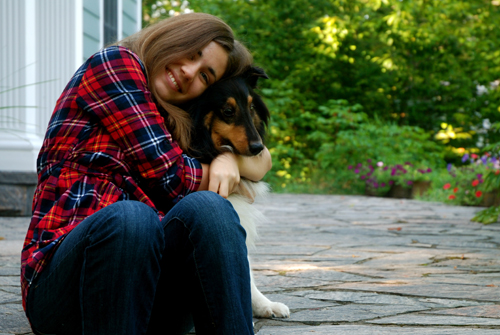
When he first moved into his new home, Edward was extremely shy. So shy that he spent his first week hidden under the bed, refusing to come out.
“I’d come home from school and pull him out from under the bed and cuddle him, and he’d purr and purr,” says fourth-year student Kimberley Richards.
Yes, Edward is a cat, one of many pets the Richards family has cared for. They arranged to foster Edward in 2007, knowing that his shyness made him less adoptable. In fact, the people from the rescue organization called him a “shadow cat,” meaning that you’d only ever see his shadow. However, after getting to know this cat a little better, the Richards family decided to offer Edward a permanent home. Four years later, he no longer lurks under the bed. “He’s much better now, much more friendly,” says Richards.
She recalled Edward’s initial struggles when she saw an ad for the Pepsi Refresh Project, offering a $10,000 grant towards a project that would “make Canada a better place.” She knew other animals were considered unadoptable for a variety of physical and behavioural problems, and thought the grant could help her develop a way to put these animals and potential owners together. “I’d give them a second chance, a second hope,” she says.
In July 2010, Richards submitted her proposal to Pepsi, including an outline of her plans and projected budget. “My idea was to have a website to feature the hard-to-adopt animals, and also have a fund for medical treatments or other things that might make some animals more adoptable,” she explains. The idea was approved and posted on Pepsi’s site for people to vote.
During the first round, Richards came in sixth, but that was good enough to move her along to the second round of voting. “I asked all my family and friends to vote, I made a Facebook page, I contacted everyone I could think of,” she says. In January 2011, she learned that she’d placed second – good enough to qualify her for the $10,000 grant.
After completing what she describes as a mountain of paperwork, Richards was able to launch her website, Second Hope Circle (www.secondhopecircle.org), in July 2011. “My friend Juan Moreno, also a U of G student, designed the site,” she adds. Richards contacted Ontario animal shelters and animal rescue organizations and so far has found 29 to sign her agreement and participate in the website activities. She continues to attend events and look for other organizations who might benefit from having their animals on her website, but she doesn’t accept all of them.
“I require the organizations to guarantee certain standards of animal care, and I only accept groups that do not euthanize animals just because of space,” she says. Once signed up, the organizations can post photographs and information about their hard-to-adopt animals on the website, and can also apply for funding from Second Hope Circle if an animal in their care needs surgery or other treatment. Richards has also created a Facebook page where animals and organizations can be featured.
Most of the animals on her website are dogs and cats, but there are also rats, turtles, rabbits, horses and other less-common pets looking for new homes.
She expects January to be a busy month: “Shelters are overrun with animals in January because people give pets as Christmas gifts and the recipient doesn’t really want it. It’s so stressful for animals to be constantly moved from one home to another. Pets should be a lifetime commitment.”
What’s the future of Second Hope Circle? Richards says it’s not a short-term project. “I hope to turn Second Hope Circle into a non-profit organization with a board of directors and register it so that we can give tax receipts for donations. I’d like to encourage more collaboration among rescue organizations so that we can all help each other. I see myself as always being involved in animal rescue and doing what I can to make animals’ lives better.”